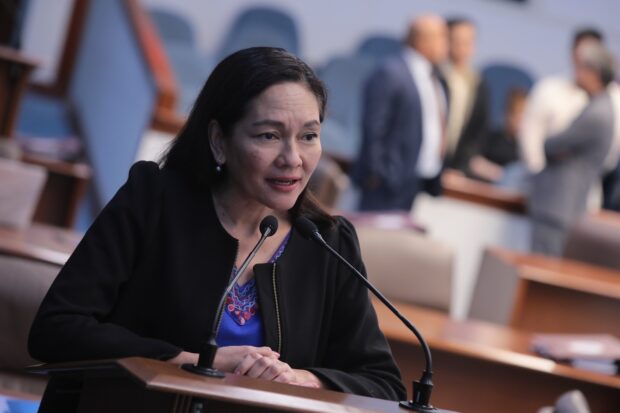MANILA, Philippines — Sen. Risa Hontiveros appealed to the Bureau of Immigration (BI) not to “bully” Filipinos going abroad under the tighter travel restrictions to be imposed next month by the government’s anti-human trafficking council.
Hontiveros, who had launched a series of exposés on the human trafficking racket within the BI, said the new policies may harm unsuspecting travelers.
“I fervently ask our (BI) not to bully our Filipino tourists; instead, let us give them a chance to relax or visit families overseas without any added hassles,” she said.
The Inter-Agency Council Against Trafficking (Iacat) announced the implementation of more stringent requirements for departing Filipinos starting on Sept. 3.
Under the Iacat guidelines, the basic travel documents required for outbound Filipino travelers are a passport valid for six months, a valid visa, and a ticket with a confirmed return flight.
For first-timers
Justice Secretary Jesus Crispin Remulla has said that the stricter travel regulations “will most likely” be applied to 90 percent to 95 percent of “first-time travelers” while the overwhelming majority of Filipinos going abroad will need only to present basic travel documents.
First-time overseas Filipino workers need to present their overseas employment certificate or clearance from the Department of Migrant Workers, a valid employment visa, and an employment contract.
Other travelers may be required to show sponsorship if their trips are paid for by other people.
Iacat said that it revised the departure protocols to “combat the grave menace of human trafficking.”
“It is of paramount importance to emphasize that the revised guidelines have been formulated not to encroach upon the fundamental right to travel, but to serve as a protective bulwark shielding our fellow citizens from the dire perils of human trafficking,” Iacat said.
But Hontiveros, who is the author of Republic Act No. 10364, or the Expanded Trafficking in Persons Act, said that while the BI is tightening the noose on outbound Filipinos, it should likewise do the same for inbound foreigners.
She clarified, however, that she supports the measures being imposed by the Iacat to curb human trafficking.
“I believe it is absolutely imperative that we do more against human trafficking. I am aware of the magnitude of this serious global problem,” she said.
In 2020, Hontiveros exposed a syndicate within the BI, which was supposedly responsible for allowing the entry of illegal foreigners into the country, mostly Chinese posing as tourists, exploiting this visa upon arrival (VUA) privileges.
‘Pastillas scam’
The scheme came to be known as the “Pastillas scam,” after the rolled-up paper bills of bribe money collected by corrupt BI personnel, which resembled the popular milk candy.
Last year, Hontiveros again led a Senate inquiry into another immigration racket that allowed Filipinos to leave the country only to fall into the hands of traffickers who forced them to work for a cryptoscamming network abroad.
Hontiveros cited concerns about a possible double standard in imposing tighter travel requirements.
“Filipinos traveling out of the country should not be treated as second-class citizens within our own airports,” she said.
Former Sen. Panfilo Lacson expressed his dismay over the latest travel policy of the Iacat.
“Simplifying visa applications for foreign tourists visiting the Philippines while complicating the requirements for Filipinos traveling to other countries is the most annoying irony in our nation’s history,” he said.
